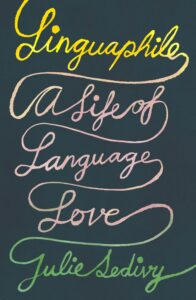There it is: the moment when I find myself thigh-deep in the squelch of memory, feet held fast, thrashing about for the word that eludes me. No amount of effort enables me to take a step forward, back, to the side, anywhere I might gain a fresh perspective from which to spot the missing word. I’m stuck. In the blank space where the word should appear, a vision of my linguistic future begins to gather like a thunderhead on a summer day. I imagine an inevitable decline, sloped cruelly away from the apex of my verbal powers and bottoming out in a reversion to dumbness.
Article continues after advertisement
And still, that damned word nowhere to be found.
Not that this is the first time I’ve misplaced a word. Far from it. But certain troubling correlations have begun to coalesce: the ache in the hip and stiffness of knee upon getting out of bed, the sudden revelation that reading glasses are useful, the growing effort of preparing a complicated dinner while chatting with the guests. All these petty weaknesses have, in this specific moment, decided to band together and bully me into submission, into conceding that I am staring at the downward path toward my own diminishment.
Becoming very old does not mean lingering in the dim twilight of irrelevance; it is to become an ever more valuable vault stuffed with experience and knowledge.
And that missing word? In hiding, too cowardly to come to my rescue.
Making matters worse is my fiftieth birthday lying in wait. From those who’ve gone before me, I know to brace myself. I’ve been warned that, much as I might strain to believe that a number is just a number, I will feel its significance in all of the less gullible cells of my body. I’ve been told that reaching this number will be like crossing an international border; once on the other side, I will be in a different country, among women whose currency has collapsed and will never recover. The language spoken there is resignation—at times, charmingly inflected with the lilt of humor and irony, but always tightly organized around a semantics of irrelevance, impotence, and decline. An entire lexicon in which to become lost.
But in fact, none of this occurs on my fiftieth birthday. On that day, I happen to be visiting a summer program related to Indigenous languages. For once, I’m one of the few White people in the room. As I exchange life stories with the participants, who come from various First Nations and northern regions of Canada, I keep hearing mentions of elders—of grandmothers and grandfathers and aunties who steadied or redirected life trajectories, who serve as the stars by which others navigate, who are the first to be consulted on matters of importance.
On that day, I have an experience similar to ones I’ve had several times since, upon encountering an Indigenous perspective. It is as if the world were suddenly inverted, pulled like a sleeve inside out. The fixed elements of the landscape, previously rooted and immobile, begin to waver and shimmer, their reality in doubt. An unfamiliar scenery claims its place.
No wave of despondency breaks over my head the day I turn fifty. Instead, I’m given the gift of altered vision—of a viewpoint from which aging is not a series of inevitable losses, starting small and becoming larger, but a steady accrual of abundance. Becoming very old does not mean lingering in the dim twilight of irrelevance; it is to become an ever more valuable vault stuffed with experience and knowledge.
What does it mean to lose something? It means, simply, that you no longer have something you once had. But the noun “loss” carries added significance, a plaintive moan as an undertone: it means that what you once had but no longer possess was a thing of value, something to be mourned. Not everything lost is a loss—one can be happy to lose a baby tooth, false friends, a crippling inhibition. Of a bad habit or an unhelpful attitude, a friend will advise, “You might want to lose that.”
By the time we are in the so-called prime of life, we have lost many, many things. Our bodies have lost the power to heal a broken bone within days. We are no longer able to learn a new language as if we were born into it. We have lost our willingness to throw ourselves to the floor in a fit of temper, and we have lost our porousness to awe and to the experience of time as spacious—as it used to be in those three interminable weeks before Christmas or the luxurious spread of summer holidays when viewed from the threshold of the last day of school.
And yet, even though we look back at our early selves with a rueful nostalgia, we do not, on the whole, think of childhood as a period defined by loss. We see it instead as a period of becoming, a long approach to what will eventually become the true shape of a person. It is a time characterized not by diminishment but by a series of trades. Like baby teeth, certain traits are exchanged for ones that are stronger, more important, or more efficient, overall a good bargain.
At six months of age, an infant can perceive the subtle differences that distinguish the sounds of any language. A six-month-old raised in an English-speaking family can easily hear that a regular d is different from its retroflex version, made with the tongue curled back—a contrast that is important in Punjabi, but not in the child’s mother tongue. A Japanese child of the same age has no trouble perceiving the distinction between r and l, an ability no longer shared by either of his parents, who hear both as variants of the same sound. By their first birthdays, however, both infants will have become less sensitive to these distinctions of sound. This is viewed not as a deficit but as growth, a side effect of learning; over time, the child learns which sound contrasts are meaningful in the mother tongue and learns to elevate these while ignoring others. The loss of attunement to the sounds of other languages is a sign of progress in one’s own.
Even though we look back at our early selves with a rueful nostalgia, we do not, on the whole, think of childhood as a period defined by loss.
How telling, then, that we view a middle-aged person’s hunt for the elusive word entirely through the prism of decline and diminishment, never through a lens of transformation or learning. When words go missing, one is apt to think of them as lost, as carelessly dropped through the holes in memory’s pockets. We take the futile searches for words to be symptoms of a lexicon that is contracting. But as with Western versus Indigenous views of aging, this perspective can easily be turned inside out.
There is little doubt that as a person ages, words go missing more often, in those moments that language scientists prosaically call tip-of-the-tongue experiences, and that new words are harder to retain. The older person’s lapses can be demonstrated in a laboratory version of a competition between young and old: both are given a new set of names to learn and recall, and the young emerge victorious, able to recall a greater percentage of names. But what looks like decline may simply be a side effect of learning. For a young person, the laboratory task is akin to having someone bring a few new books into their apartment, spare in furniture and belongings, and being asked to locate the newly acquired items.
For an older person, it’s like bringing the same books into a house in which they have lived for forty years: the new books are absorbed into overstuffed shelves, littered about on the ample furniture, and stacked onto piles teetering on the desk, dining room table, and sideboard. Is it any wonder that engulfed in such abundance, the older person will take longer to retrieve a specific item or come up empty-handed or with an armload of substitutions for the requested book?
Astute scientists have asked: If a sixty-year-old can recall only 90 percent of the thousand names she knows, while a sixteen-year-old can recall 98 percent of the hundred names she knows, whose memory is more powerful? What if the purported symptoms of a contracting lexicon are really signs of one that is expanding? Indeed, closer scientific scrutiny reveals that far from shedding words, we hoard them over a lifetime. Unless a person is afflicted by brain disease, her vocabulary continues to grow into old age, becoming a magnificent warehouse of words in which anyone might lose themselves.
__________________________________

Excerpted from Linguaphile: A Life of Language Love by Julie Sedivy. Published by Farrar, Straus and Giroux. Copyright © 2024 by Julie Sedivy. All rights reserved.

